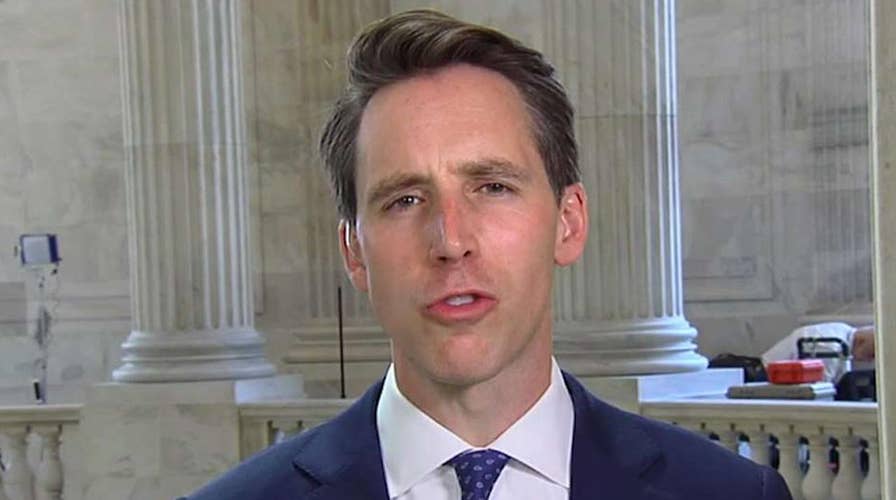Sen Hawley proposes legislation against Big Tech's legal protection
Senator Hawley proposes legislation taking aim at Big Tech's legal protection.
Two prominent Republican lawmakers asked the Federal Trade Commission Monday to investigate how big tech companies curate their content, citing the “enormous influence” wielded by Twitter, Facebook and Google.
The letter, from Sens. Josh Hawley, R-Mo., and Ted Cruz, R-Tex., asks the agency to seek information on the conduct and practices of big tech companies, specifically regarding what content they restrict or promote and how those decisions are made. The effort is part of a larger push by some Republicans against what they characterize as anti-conservative censorship by tech companies -- an accusation that Silicon Valley has consistently denied.
“Big tech companies like Google, Facebook, and Twitter exercise enormous influence on speech” Hawley and Cruz said in a letter. “They control the ads we see, the news we read, and the information we digest. And they actively censor some content and amplify other content based on algorithms and intentional decisions that are completely nontransparent.”
TRUMP HOSTS CONSERVATIVE FIREBRANDS FOR SOCIAL MEDIA SUMMIT: 'WE'RE NOT GOING TO BE SILENCED"
Hawley and Cruz wrote that big tech has the potential to sway elections by controlling content users see, but have no public accountability because their processes aren't public. They also asked the FTC to release any information it deems of public interest.
Although these companies are loathe to share public information detailing their proprietary algorithms, each does publish information about content curation decisions. Facebook's community standards are here, Google's search rater guidelines are here and Twitter's rules and policies are here.
Google Vice President Karan Bhatia responded to accusations of political censorship in a Fox News op-ed on Monday.
“We want all people – regardless of race, nationality, gender, religion, or political leanings – to find our products useful. That requires, above all, that we earn and maintain their trust,” he wrote.
“These algorithms don’t detect political perspectives, much less use them in any way to determine how webpages are ranked. Objective third-party studies – including, most recently, a comprehensive year-long assessment of Google News results by The Economist – have found no evidence of ideological bias in either direction.”
ACTIVISTS BLAST TWITTER'S HATEFUL CONDUCT POLICY UPDATE AS 'SIMPLISTIC'
Bhatia, a former senior official in the George W. Bush administration, says he will rebut accusations of bias at Google Tuesday before the Senate Judiciary Subcommittee on the Constitution, where Cruz serves as the chairman. Previously, Google told Fox News that Search is not used to set any political agenda and not biased in favor of any political party.
Twitter did not comment on Cruz and Hawley’s letter and Facebook did not respond to a request for comment.
Hawley has led efforts against perceived censorship with the Ending Support for Internet Censorship Act, which he introduced in June.
The bill would take away the immunity tech companies have as platforms for user-produced content if they censor based on political viewpoint. It specifically aims at Section 230 of the Communications Decency Act, which legally protects companies that provide platforms for users – from Yelp to Craigslist to Facebook – from responsibility for what those users post.
Big tech companies would be required to have their algorithms and curation practices audited every two years to prove they are not biased under Hawley's bill. Otherwise, they will lose their Section 230 immunity.
“With Section 230, tech companies get a sweetheart deal that no other industry enjoys: complete exemption from traditional publisher liability in exchange for providing a forum free of political censorship,” Hawley said in a press release when he announced the bill. “Unfortunately, and unsurprisingly, big tech has failed to hold up its end of the bargain.”
CLICK HERE TO GET THE FOX NEWS APP
But some say Hawley’s proposal harms free speech rather than protecting it. “Hawley’s standard is most assuredly not the viewpoint-neutrality standard seen in First Amendment case law,” conservative writer David French said in the National Review. “It’s a carnival funhouse version that would invite an enormous amount of bureaucratic meddling.”
Fox News' Tyler Olson contributed to this report.











































